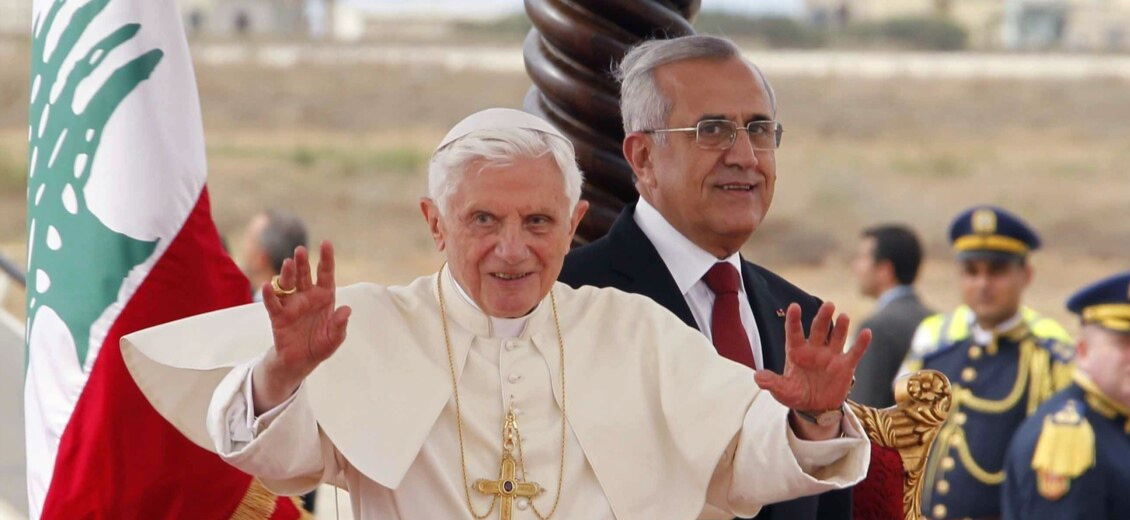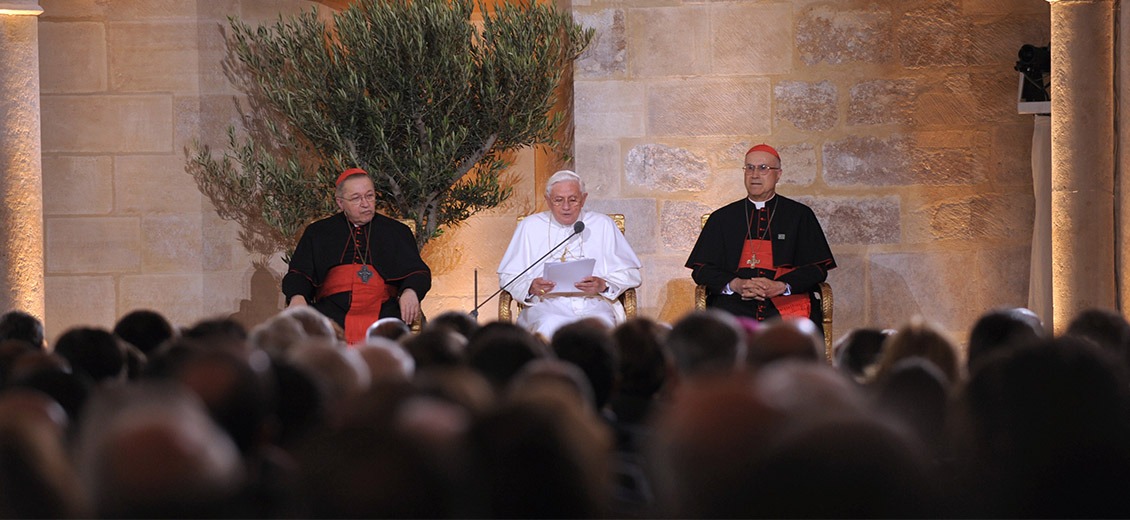nicknamed the Panzerkardinal, Pope Emeritus Benedict XVI has just been buried. His brand image remains that of a man whose integral humanism remains misunderstood. Timid and humble, he distinguished himself by the immensity of his knowledge and by the inflexible rigor of his thinking, which did not protect him from blunders. Well of science and culture, Joseph Ratzinger achieved in himself the harmonious synthesis of the most eminent Catholic theologian Thomas Aquinas, and the greatest humanist of the Renaissance, Enea Silvo Piccolomini, Pope Pius II. Will history be able to do him justice?
Listen to the article:
Public opinion unfortunately retains of Joseph Ratzinger, or Benedict XVI, only two moments of his career as an exceptional intellectual and a man of the church conscious of his mission of service. The controversy surrounding his speech of September 12, 2006 known as the “Regensburg controversy” continues unabated. Similarly, he is bluntly accused of traditionalist fundamentalism because of his letter in motu owner of April 7, 2007, Summorum Pontificum, by which he wanted to restore liturgical peace within the Latin Church. The fundamentalist excesses of certain traditionalist circles will lead the current Pope Francis to review the conditions of application in his motu owner from December 4, 2021, Traditionis Custodes, in order to prevent the risks of destabilizing the achievements of the Second Vatican Council. It is up to historians to unravel the complex web of these controversies. The figure of Benedict XVI, however, remains that of a great mind with vast and extensive knowledge. A shy and humble man, he dedicated his whole life, in accordance with his convictions, to the service of the three pillars of the Church: witness to the truth, the sacramental mission of the liturgy and above all the diakonia or service of charity. In short, he always wanted to be a “useless servant”, like all great men, which sheds light on his abdication in 2013, as his predecessor Celestine V (1210-1296) had once done.
In the socio-political field, we will remember two key moments of his pontificate. On the one hand, his speech to the world of culture, delivered in Paris at the Collège des Bernardins on September 12, 2008, which literally amazed intellectuals on all sides. On the other hand, his speech to the political and diplomatic world delivered at the Presidential Palace of Baabda in Lebanon on September 15, 2012, during his last official trip which preceded his abdication. Baabda’s speech is in a way his political testament.
The speech of the Bernardins (12/09/2008)
Undoubtedly one of the monuments of integral humanism, through which Benedict XVI reveals the extent of his reflection which embraces the entire history of Western thought. He starts from an observation that the theologian Henri de Lubac had made before him, that of the “drama of atheistic humanism” as it emerged in the 18th century in the context ofAufklärung (Enlightenment philosophy). Rejecting anthropocentric atheistic humanism, Ratzinger is far from wanting to return to the theocentric humanism of the Middle Ages, and this by emphasizing the eminent value of human work. Man is neither a servile slave nor a fierce rival of God. At the Bernardins, Benedict XVI affirms that “the work and determination of history by man is a collaboration with the Creator”. Specifying his thought, he continues: “Where this measure is lacking and where man elevates himself to the rank of deiform creator, the transformation of the world can easily lead to its destruction”. All is said. Man is superior to the angels thanks to his corporeality which allows him to master the forces of chaos. Without the concern for transcendence, dear to Ratzinger, man has only to let himself go to want to dominate and possess, incestuously, this Mother Nature. Through the work of his reason and his hands, man participates in the creative work of this god to whom he resembles. Man in the world drinks from two sources: the culture of work and the culture of speech, that is to say of reason. Faced with nature, the latter is no longer the implacable Mother-Nature but the companion of man on the paths of history that human work continues to develop thanks to Reason and the tools it forge. This is in line with the revolution wrought by cutting-edge scientific thought, dubbed The New Covenant by Ilya Prigogine and Isabelle Stengers, thus qualifying the relationship between the human mind and the reality it contemplates. The discourse of the Bernardines is also intended to be a new alliance between man and God. Such is the first profile of the integral humanism that one detects in J. Ratzinger. A humanism reconciled with the whole of creation and with itself; a humanism open to transcendence and rational, living and dynamic; an efficient humanism, working in favor of the common good of men and the dignity of everyone. Man is no longer a stranger in an unintelligible world where he would have emerged by a fortuitous and arbitrary chance.

Baabda’s Speech (09/15/2012)
This integral humanism is at the very heart of the speech that Benedict XVI gave on September 15, 2012 at the Presidential Palace of Baabda during his official trip to Lebanon, the last of his pontificate. This humanism, reconciled with transcendence, turns out to be the very foundation of politics and the condition required for the establishment of peace in regions shaken by violence. This discourse is the foundation of the political order as the organization of human space so that the human person can, from his conception to his death, achieve his natural ends and prepare for his supernatural ends. It is a vibrant and exemplary plea, unique since the Discourse on the Dignity of Man, by Pic de la Mirandole, in favor of an authentic and rediscovered humanism which does not put man and God in a belligerent face-to-face as atheistic humanism does. This is where the novelty lies, which should constitute a platform for dialogue between Western modernity in disarray and an Islam in full turbulence. The public, present at Baabda that day, had the privilege of discovering for the first time an exceptional synthesis of the conception of the inalienable dignity of the human person as an end in itself.
It is almost certain that the Lebanese political caste, uneducated by definition, cannot grasp the content of such a thought centered on the finitude and dignity of every human person. “[…] cultural, social, religious differences, must lead to living a new type of brotherhood, where precisely what unites is the common sense of the greatness of every person […] There lies the way to peace”. His refusal of any violence, verbal and physical, is justified because it is always “an attack on human dignity, that of the author as well as that of the victim”. The logic force, in the name of rights of such and such a confession can only be, therefore, the expression of evil. The latter “is not an anonymous force which acts in the world in an impersonal way (…) Evil goes through human freedom (…) He is looking for an ally, man”. Advocating a culture of good and peace, through the forgiveness that is given and received, he warns that “the inaction of men of good must not allow evil to triumph. It’s even worse to do nothing.”
He closes by urging his audience to do everything possible to protect “these few reflections on peace, the dignity of the person, the values of the family, dialogue” which are not “simple stated ideals […]. Lebanon is called, now more than ever, to be an example”.
Ten years later, these words remain a dead letter in the eyes of Lebanese leaders, including Christians, who are solely concerned with force, revenge, tribal clanism and the narcissistic rights of religious groups.
Has the Lebanese politician become, today, the privileged ally of the evil evoked by this great spirit that was Benedict XVI?
[email protected]
We would like to say thanks to the writer of this article for this outstanding material
A “panzerkardinal” steeped in integral humanism
You can find our social media profiles , as well as other related pageshttps://nimblespirit.com/related-pages/

